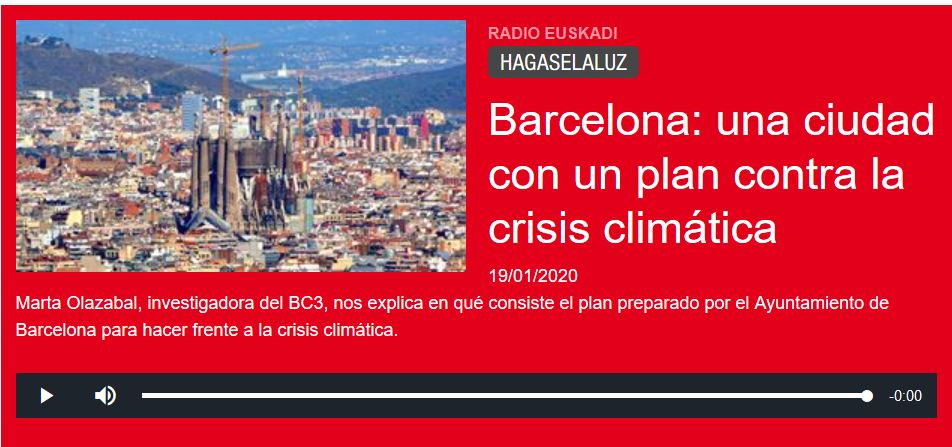January 20, 2020
Published by Unai Pascual BC3Research at January 20, 2020
Categories
Unai Pascual, investigador Ikerbasque en Basque Centre for Climate Change y co-autor del último informe de IPBES, ha participado en la jornada "Prosperidad sin Naturaleza" en Barcelona, una jornada organizada por la comisión de Economía y Sostenibilidad del Colegio de Economistas de Cataluña, el Departamento de Territorio y Sostenibilidad, el Consejo Asesor para el Desarrollo Sostenible ( CADS), el Centro de Investigación Ecológica y Aplicaciones Forestales (Creaf) y el Centro Tecnológico Forestal de Cataluña (CTFC). El investigador destacó la necesidad de ir hacia una economía verde y enfocarnos hacia un nuevo modelo económico. "Se deben fomentar nuevos valores en la economía que vayan más allá de la productividad", aseguró, y remarcó la necesidad de poner énfasis en la biodiversidad, porque, como dijo, "está muy lejos de tener la relevancia que debería tener ".
January 22, 2020
Published by Marta Olazabal BC3Research at January 22, 2020
Categories
Marta Olazabal, investigadora del Basque Centre for Climate Change y especializada en adaptación y resiliencia urbana, ha valorado la declaración de emergencia climática y el plan de acción contra la crisis climática del Ayuntamiento de Barcelona este domingo en el programa de Radio Euskadi, Hágase la Luz. Para la investigadora, el plan de Barcelona es un “hito” a nivel nacional. Las 100 medidas y 7 cambios de modelo traerán “cambios fuertes en todos los ámbitos para hacer frente al cambio climático”.
January 22, 2020
Published by BC3Research Elisa Sainz de Murieta at January 22, 2020
Categories
Sea-level rise represents one of the main impacts of climate change. Globally, low elevation coastal areas represent 2% of the surface area, but account for 10% of the world's population and many of the economic assets and infrastructures. Moreover, the increase in sea level causes extreme values occur more frequently, affecting the exposed communities and assets (environmental and economic) more severely. This also generates an increase in the erosion rate, increasing the recoil of the coastline, which in turn makes the coastal and active resources located there much more exposed. In this context, it is essential to understand current and future risks and a number of studies show the need to adapt the format of the information to the agents who need to make decisions on adaptation.
February 6, 2020
Published by BC3Research Agustín del Prado Bosco Lliso at February 6, 2020
Categories
This infographic video has been produced as part of the BC3- Basque Centre for Climate Change contribution to the COP25 in Madrid (Pabellón España-5th December 2019) and under the H2020 project iSAGE.
The video attempts to graphically illustrate why ruminants are not to be blamed for climate change. Different arguments are shown regarding the differences between emissions from biogenic methane from ruminants and fossil fuel CO2, differences in production systems and the uncertainties regarding N2O emissions and the baseline of reference to compare emissions from ruminants compared with other activities.
The video idea and script have been developed by Agustin del Prado (BC3) and Pablo Manzano (University Of Helsinki), animated and produced by Yelena Grigorenko and voice over by Bosco Lliso (BC3).
Do you like it?




